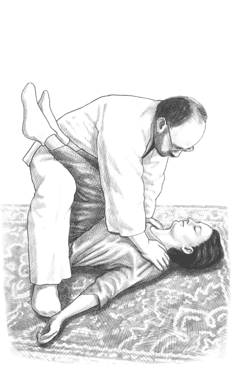Take Time to Nurture and Renew Yourself
Take Time to Nurture and Renew Yourself
“At any given moment, you have a chance to experience that moment only. Not what happened in the past, not what’s going to happen. This moment is what is given to you to experience. So just come to it. The next moment will take care of itself.”- from “Freedom Comes from Understanding,” by Jon Schreiber, Director of the Breema Center.
We’re all under the pressure of time. Our fast-paced, event-filled lives can create physical and psychological stress and take a toll on our health. To counteract the effects of so much activity, we need some simple time for renewal.
Even during time off, the mind may dwell on past events we can’t change, or rush toward an imaginary future. Our feelings get dragged along with our chaotic thoughts. The body swings between tension and inertia, so that even enjoyable activities don’t really relax and restore us, and we don’t draw benefit from them. We usually live in the periphery of life, which is not truly satisfying. Only when we are present can we receive the deep nurturing of connection to our essential nature.
So when we wish to be present, how do we keep the demands of life, and conflicts and expectations, from sweeping us up, so our wish doesn’t fade away? Breema—a holistic system of bodywork, self-care exercises, and universal principles—provides tools to help us benefit from that wish more often.
The Body Is Always Present
One key Breema provides is connection to the body, which is always in the present. By establishing a true body-mind connection, it’s possible to have tangible moments of presence. To do that, we bring the attention of the mind to the activity of the body. It sounds simple, but needs practice.
For example, in a Breema class as you practice a bodywork sequence or Self-Breema, you remain with your movement, and only that, as long as you can. When you get distracted, you bring the mind back, with no judgment. You wish to be with your activity as if it’s the only thing in the world that you have to do, and you have all the time in the world to do it.
As you continue, the mind quiets down, the feelings are calm, and the body finds its own natural comfort and rhythm. As body, mind and feelings become unified, you may taste simply being present.
After practicing this in class, we can gradually bring it to our daily lives, to more fully participate in our ordinary activities, like wiping the table or feeding the cat. Having moments of being present can imbue these tasks with meaning and deeply nourish us.
Remaining Balanced Creates Harmony
Another key to becoming present is applying the Nine Principles of Harmony in how we approach life. Usually, we react automatically to events or to what people say to us, based on concepts or unexamined habits. We blame or justify, withdraw, or do things that waste our time and energy. But what if we had simple guidelines that could support us to be less reactive and more balanced in response to what occurs?
Breema’s Nine Principles are just such useful guidelines. When we see dislike of what someone does based on our conditioned ideas, we can remember No Judgment. When we rush through getting dressed, writing an email, or driving to our job, we can remember Single Moment/Single Activity, and come to actually know we are tying our shoes, or typing, or holding the steering wheel. Using any of the Principles can cultivate a new posture toward life, so we can relate with more vitality, in a more openhearted way.
Studying and applying what Breema offers can help us have more calm, balanced moments that restore us and support healthy, harmonious relationships to ourselves and others.
by Elaine Pendergrast For Somona County Gazette
Be the first to post a message!
